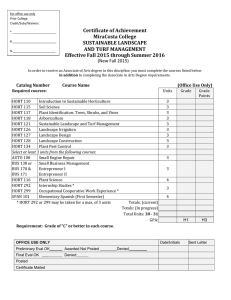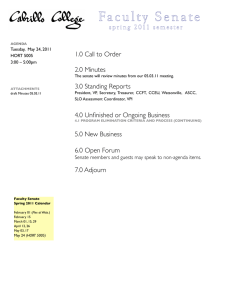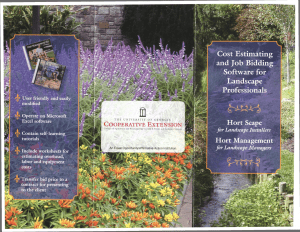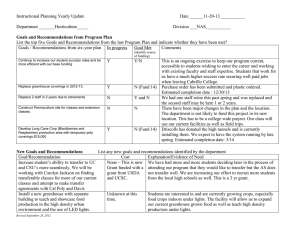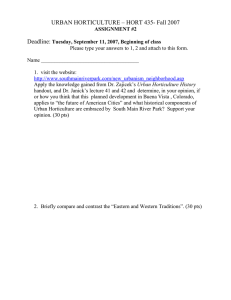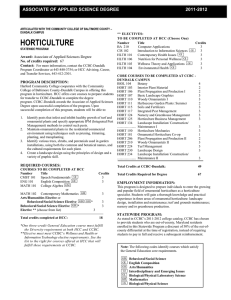Environmental Plant Science Monroe Technology Center
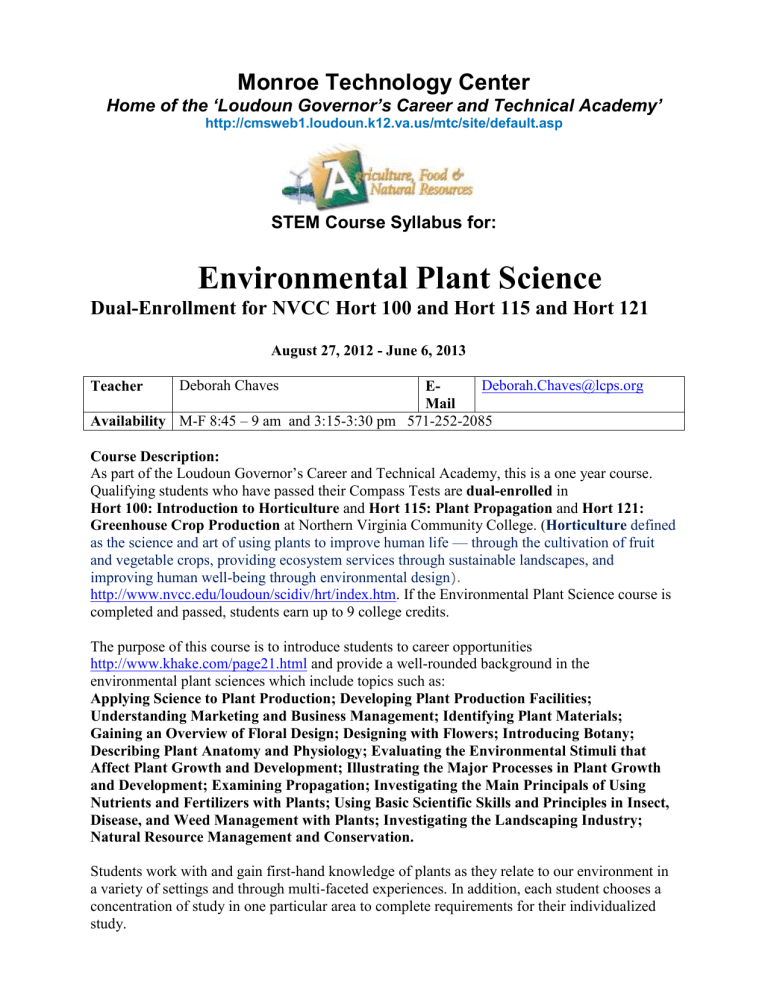
Monroe Technology Center
Home of the ‘Loudoun Governor’s Career and Technical Academy’
http://cmsweb1.loudoun.k12.va.us/mtc/site/default.asp
STEM Course Syllabus for:
Environmental Plant Science
Dual-Enrollment for NVCC Hort 100 and Hort 115 and Hort 121
August 27, 2012 - June 6, 2013
Teacher Deborah Chaves E-
Deborah.Chaves@lcps.org
Availability M-F 8:45 – 9 am and 3:15-3:30 pm 571-252-2085
Course Description:
As part of the Loudoun Governor’s Career and Technical Academy, this is a one year course.
Qualifying students who have passed their Compass Tests are dual-enrolled in
Hort 100: Introduction to Horticulture and Hort 115: Plant Propagation and Hort 121:
Greenhouse Crop Production at Northern Virginia Community College. ( Horticulture defined as the science and art of using plants to improve human life — through the cultivation of fruit and vegetable crops, providing ecosystem services through sustainable landscapes, and improving human well-being through environmental design
).
http://www.nvcc.edu/loudoun/scidiv/hrt/index.htm
. If the Environmental Plant Science course is completed and passed, students earn up to 9 college credits.
The purpose of this course is to introduce students to career opportunities http://www.khake.com/page21.html
and provide a well-rounded background in the environmental plant sciences which include topics such as:
Applying Science to Plant Production; Developing Plant Production Facilities;
Understanding Marketing and Business Management; Identifying Plant Materials;
Gaining an Overview of Floral Design; Designing with Flowers; Introducing Botany;
Describing Plant Anatomy and Physiology; Evaluating the Environmental Stimuli that
Affect Plant Growth and Development; Illustrating the Major Processes in Plant Growth and Development; Examining Propagation; Investigating the Main Principals of Using
Nutrients and Fertilizers with Plants; Using Basic Scientific Skills and Principles in Insect,
Disease, and Weed Management with Plants; Investigating the Landscaping Industry;
Natural Resource Management and Conservation.
Students work with and gain first-hand knowledge of plants as they relate to our environment in a variety of settings and through multi-faceted experiences. In addition, each student chooses a concentration of study in one particular area to complete requirements for their individualized study.
A number of industry certification opportunities, internships and work experiences are available through this course and students are encouraged to pursue them as they enhance their college and scholarship opportunities.
Students travel off campus during school hours to attend lectures at NVCC, engage in a variety of field events and outdoor labs and participate in related field trips. FFA http://www.ffa.org/
is an integral part of the curriculum where students may also participate in many enriching events and competitions at the area, state and national level.
Prerequisites:
Competitive application process
Pass COMPASS Tests for dual-enrollment in NVCC
Prior completion of biology and chemistry is encouraged
Texts/Resources:
Current readings and periodicals related to environmental plant sciences
Common Native Trees of Virginia VA Dept of Forestry
VA Nursery and Landscape Assoc Certification Manual
Greenhouse Operator’s Training Manual
VA Flower Growers Assoc
Horticulture Principles and Practices by George Acquaah
Horticopia Professional Edition
Landscape Pro Software
Grading:
Grading will follow the policy of Loudoun County Public Schools.
Numeric Value Letter Grade
98 - 100 A+
Quality Points
(before weighting)
4.3
93 - 97
90 - 92
87 - 89
83 - 86
A
A
B+
B
4.0
3.7
3.3
3.0
80 - 82
77 - 79
73 - 76
70 - 72
67 - 69
63 - 66
B
C+
C
C
D+
D
2.7
2.3
2.0
1.7
1.3
1.0
60 - 62
0 - 59
D
F
0.7
0.0
Student grades will be based on a point system. Categories for assignments include: tests, quizzes, labs, projects and written work. Each assignment will be worth a specific number of points. The student’s grade will be the percentage obtained by dividing the number of points earned by the number of points possible.
Ex: John Doe earned 869 points out of a possible 900. 869/900 = 96.6%
***Dual-enrolled students receive a weighted grade for this class and grades become a part of the student’s permanent college transcript.
Requirements:
Complete syllabus requirements of NVCC Hort 100 Introduction to Horticulture (see attached NVCC syllabus) and Hort 115 Plant Propagation
Take the Virginia Greenhouse Operator’s Certification exam offered through the Virginia
Flower Growers Assoc http://www.hort.vt.edu/Floriculture/VFGA/index.html
and administered through Virginia Tech in May (students receive an additional 2 verified high school credits upon passing)
Option to take the Virginia Nursery and Landscape Association Certification Exam http://www.vnla.org/certification.htm
in May
Option to take the
VA Pesticide Applicator’s Technician
test and become registered http://www.vdacs.virginia.gov/pesticides/
Take the Workplace Readiness Skills for the Commonwealth http://www.cteresource.org/apg/credentials/workplace-readiness-skills-for-thecommonwealth-1063
Timely completion of reading, oral, written and lab assignments both on and off campus
Participation in events as an FFA member
Compliance with class rules
Effectively communicate and interact with the public
Practice safety at all times with equipment
All permission forms due by start of 2nd class.
Use a laptop in class for assignments and submit assignments via email
Fulfill afterhours participation in Fall, Holiday and Spring Plant Sales
State Credentials Offered:
Virginia Greenhouse Operator’s Certification Exam offered through the Virginia
Flower Growers Assoc http://www.hort.vt.edu/Floriculture/VFGA/index.html
and administered through Virginia Tech in May (students receive an additional 2 verified high school credits upon passing)
VA Pesticide Applicator’s Technician
test and become registered technician http://www.vdacs.virginia.gov/pesticides/
Workplace Readiness Skills for the Commonwealth http://www.cteresource.org/apg/credentials/workplace-readiness-skills-for-thecommonwealth-1063
Format and Expectations:
All permission forms must be signed and turned in by the 2nd class or the student will not participate in related activities and a parent conference will be scheduled. The class is conducted using many formats and students experience a broad range of learning opportunities from lecture, discussions and hands-on applications to team projects and field trips. Many assignments and labs will be conducted by university and college professors as well as professionals from many organizations, agencies and businesses. This requires students to be in class on time every day, to be professional and to always be prepared with laptops (provided), study materials and questions!
Dress code:
The MTC Agriculture, Food and Natural Resources Department is a showcase for the school and community. Hundreds of guests and customers visit and shop in the plant areas each year and purchase their quality products which supports the program and the scholarship fund. Students are the department models both @ MTC and off campus. MTC students are expected to appropriately communicate and interact with the public during all events. Compliance with the
dress and professional behavior code is mandatory. Appropriate clothing for Environmental Plant
Sciences varies depending upon the activity.
Much of this class is conducted outdoors and/or in lab situations. Students travel to off-site locations frequently and in all types of weather and should always be prepared with appropriate clothing, food, etc. Lockers are provided where students are expected to keep additional clothing , shoes, boots, coats, etc.
Khakis/ jeans/ bermuda shorts and shirts with sleeves are acceptable for regular work/lab days.
**Clothing may get soiled due to the nature of the coursework and MTC is not responsible for any loss or damage.
Hats may be worn outdoors and in the lab but must be removed in hallways and other areas of building. Safe footwear is required. Closed toe shoes required for certain labs.
Flip flops are prohibited due to safety.
Business/professional dress may be required during special events and on field trips.
Week of:
Tentative Course Outline:
August 27
(corresponds to week 1 Hort
100; Hort 121
NVCC)
Topics/ Major Concepts
Covered
Orientation
Lab Safety
Terminology
Intro to Chrysanthemum culture
Intro to Poinsettia culture/Growth regulators
Urban Forestry
Classification and Binomial
Nomenclature;
Plant morphology
FFA overview
Assembly
Readings to be Discussed Major Assignments, Projects,
Activities
Read Ch 2 "Principles and
Practices": Classification and Binomial Nomenclature;
Plant morphology
Mum handout
Pinching Poinsettias
Safety
Read Ch 2 "Principles and
Practices": complete questions under outcomes assessment 1-10 p.
61. Submit questions electronically as an attachment to
Deborah.Chaves@lcps.org
8/31/2011 9am.
All permission forms due
by
Sept 5
(corresponds to week 1 Hort
100; 121
NVCC)
Sept 10
(week 3,4,5,6,
14 Hort 100
NVCC)
September 17
(week 3,4 Hort
100 NVCC;
Hort 115; Hort
121 )
Sept 24
(week 6 Hort
100 NVCC)
Sales/marketing
Botany
Forest Trees of Virginia
Genetics experiment w/ http://www.plantingscience.org/
Conditioning flowers
(Above cont.)
Turfgrass applications
Poinsettia culture
FALL PLANT SALE
Forestry/dendrology
Careers/Pathways
SEPT 19, 20, 21
(above cont)
VNLA Ch 1 Botany
GO Ch 5A Basic Botany
Poinsettia hand-out
Conditioning flowers
VNLA CH 1; GO Ch
5; P & P Ch 2, 3
Careers/Pathways
(Above cont.)
VNLA Ch 12: Lawns
FALL PLANT
SALE SEPT 19, 20,
21
Biotech and plant genetics
P & P Ch 6 review
Poinsettia lab: mechanical growth control
Forest Trees
Terminology/sales/mum quiz
Poinsettia lab: production techniques
VNLA Ch 1 Botany questions
GO Ch 5A Basic Botany questions
Guest lecturer Bruce
Nash/NVCC
Forestry ID
Quiz
Lab w/ Soil and Water
Conservation
Forestry ID’s due
Individualized study labs intro
Test on classification/morphology
VNLA Ch 12: questions
FALL PLANT SALE
SEPT 19, 20, 21
ID Test Forestry Trees
Quiz
October 1
(week 14 Hort
100)
Soils, water and wetlands conservation
VNLA: Water
Quality; GO Ch 7:
Irrigation Water;
VNLA Ch 2 Soils
Loudoun Soil & and Water
Conservation riparian planting field trip
Soils lab
October 9
October 15
Plant Growth & Development GO Ch 5 Plant Growth &
Development
GO Ch 5 Plant Growth &
Development questions
October 22
Plant Growth & Development
Plant Propagation
Plant Propagation
October 29 Individualized study
Integrating STEM
Nov 7
(Hort 115 week
2; Hort 100 week 10)
Nov 12
(same as above)
Controlled environmental systems
Nutrition and fertilizers
Plant Propagation GO Ch 5 Plant Growth &
Development questions test;
Plant Propagation: questions from
Ch 6 GO
Ch 7 VNLA
Plant Propagation Lab and review Plant Propagation
Ch 6 GO
Ch 7 VNLA
Plant Propagation
Ch 6 GO
Ch 7 VNLA
GO CH 4; P & P Ch
15, 5
Plant Propagation Test
Reviews
END OF 9 WEEKS Nov 2
Nutrition and fertilizers
GO Ch 8
VNLA Ch 2: pp 39-54
Nutrition and fertilizers
Questions from GO Ch 8;
VNLA Ch 2: pp 39-54
Nov 19
Nov 26
Dec 3
(week 13, 14
Hort 100)
Dec 10
Nutrition and fertilizers
Salesmanship
Specialty Horticulture
Thanksgiving Break 21-23
Salesmanship
Specialty Horticulture
Interior plantscaping
Plant
Nutrition/chemistry
Holiday Open House
Dec 5, 6, 7
Interior plantscaping
Nutrition and fertilizers
GO Ch 8
VNLA Ch 2: pp 39-54
Salesmanship
Specialty Horticulture
GO Ch 1-3
Interior plantscaping
VNLA Ch 9
P & P ch 12; VNLA
Ch 2, 9; GO Ch 8
Holiday Open
House Dec 5, 6, 7
Nutrition and fertilizers Test
Salesmanship
Specialty Horticulture
GO Ch 1-3 questions
Questions
Quiz
Labs
Holiday Open House
Dec 5, 6, 7
Interior plantscaping
VNLA Ch 9 questions
Dec 17 Interior Plantscaping
Floral Design
Interior Plantscaping
Floral Design
Interior plantscaping
VNLA Ch 9 Test
Plant ID
Jan 2
(week 9 Hort
100; week 5-
12, 15 Hort
115; Hort 121)
January 7
(same)
Plant Production
(above cont)
Plant Production GO Ch 9 Plant Production GO Ch 9 questions
(above cont) Plant Production GO Ch 9 questions
Plant ID
January 14
(same)
Mid Term EXAMS
End of 9 weeks Jan 17
Mid Term EXAMS review Mid Term EXAMS
January 22
(NOVA Hort
115 week 6, 8,
12, 14)
January 28
(NOVA Hort
115 week 11,
12, 13)
February 4
(corresponds to week #9 Hort
100 NOVA)
(NOVA Hort
115 week 7, 5,
10)
Feb 11
Feb 19 corresponds to week 6,7 Hort
100 NOVA)
Feb 25
Insects and diseases of ornamental plants; pesticides and their safety
Above cont
Pruning
Pruning
Plant Production: herbs, perennials, hanging baskets
Greenhouse Plant production of bedding plants
Insects and diseases of ornamental plants
GO Ch 10, 11
VNLA Ch 3-6
Above cont
Pruning Video
Demos
VNLA Ch 8
Pruning (and
Propagation from/Grafting/Buddi ng
Hort Principles/Prac
Ch 20
Demos
Hort Princ & Pract
Ch 22
Insects and diseases of ornamental plants: questions from
GO Ch 10, 11
VNLA Ch 3-6
Plant ID
TEST on above
VNLA CH 8 Questions and
Test
Pruning Labs
Production labs
Lab @ NOVA Seeds
VNLA Ch 7 questions
Plant ID #6
Above cont.
March 4
(corresponds to week7 Hort 100
NOVA)
(NOVA Hort
115 week 11,
12, 13)
Greenhouse and
Nursery Plant production of bedding plants
March 11
(corresponds to week 8 Hort
100 NOVA)
(NOVA Hort
115 week 8)
Herbaceous Plants/
Growing in
Greenhouses
Annual and Perennials in the Landscape
March 18
(corresponds to week #9 Hort
100 NOVA)
(NOVA Hort
115 week 10,
11, 12)
April 2
(corresponds to week 10 Hort
100 NOVA)
(Hort 115 11,
12, 13)
April 8
(corresponds to week 14 Hort
100 NOVA) end of 9 weeks
April 15
Fruits in the Landscape
End of Grading
March 22
Spring Break March 25-29
Vegetable Gardening
Landscape Design
Catch up week/flexible
VNLA Ch 14
Herbaceous Plants
Horticulture
Principles and Pract
Ch 4, 15)
VNLA CH 11
Fruits
Hort Principles and
Pract Ch 26
VNLA CH 10
Vegetable
Production
VNLA CH 15
Landscape Design
April 9
April 22
April 29
Landscape Design and
Maintenance
VNLA CH 16
Water Quality and
Conservation
Spring Plant Sale
May 1, 2, 3
VNLA CH 15
Landscape Design
Lab @ NOVA
Greenhouse Environmental
Control
VNLA Ch 14 questions
Plant ID #7
Lab @ NOVA Pruning
VNLA Ch 11 questions
VNLA CH 10 questions and Test
Plant ID #7 Test
VNLA Ch 15 Questions
Landscape Pro Design #1
Problem
Plant ID #8
Lab @ NOVA Landscape
Design
Plant ID #9 Test
Spring Plant Sale
May 1, 2, 3
Spring Plant Sale
May 1, 2, 3
May 6 Portfolio and Review week
May 7
May 13
May 20
May 28
June 3
Landscape Design &
Maint
VNLA Exam ; GO
Exam
Turf Maintenance and
Equipment
Turf Maintenance and
Equipment
EXAMS
MTC GRADUATION
June 6
Review of VNLA all chapters
VNLA Cert Exam;
GO Exam
Landscape Design Problem
Landscape Pro
Plant ID #Test for VNLA
Certification
VNLA Exam; GO Exam
Sports Turf
Magazine
Zero-Turn Mower manual
Sports Turf
Magazine
Zero-Turn Mower manual
MTC
GRADUATION
Mowing techniques
Landscape equipment and use
Mowing techniques
Landscape equipment and use
MTC GRADUATION
